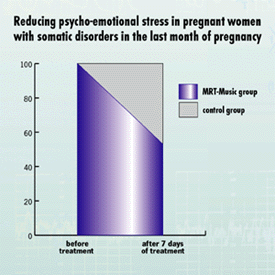When the time of labor comes nearer many pregnant women experience increasing anxiety and/or emotional stress. These parameters were measured by the help of the color choosing test of Luescher (H. Luescher 1994) in an experimental group of patients listening to Medical Resonance Therapy Music® in addition to a conventional treatment with medical drugs and physio-therapeutic exercises and in a control group with the conventional treatment only.
Medical Resonance Therapy Music®
Group
In addition to the conventional treatment the 15 women in this group listened for seven days each day for one hour to the Medical Resonance Therapy Music® right after the physio-therapeutic exercises.
At the end of the treatment psychoemotional stress was lowered by 47%.
Control GroupIn addition to the conventional treatment the 15 women in this group listened for seven days each day for one hour to the Medical Resonance Therapy Music® right after the physio-therapeutic exercises.
At the end of the treatment psychoemotional stress was lowered by 47%.
This 10 women in this group received the conventional treatment “only” and no significant changes in the status of the emotional stress level were documented.
Investigators:
Prof. Dr. med. A. Reznikov
Dr. med. A. Yakovlev

